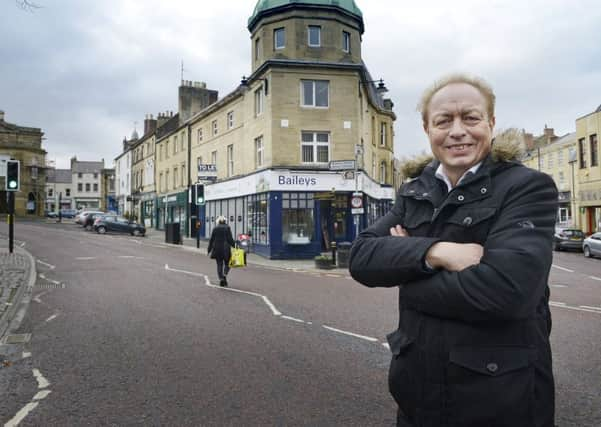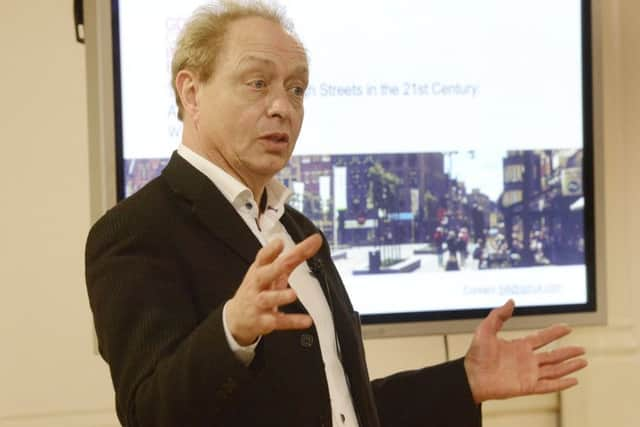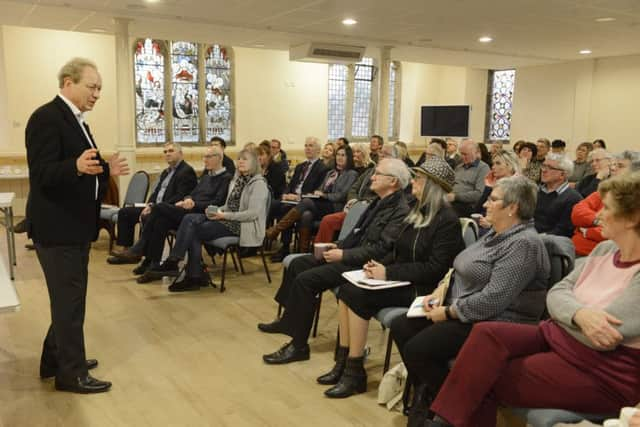Retail analyst says high streets are dead and buried


On a visit to Northumberland last week, he outlined a somewhat sombre outlook for town centres across the country unless there is significant change.
“I can’t come here and do a two-hour walkaround and then wave a magic wand and provide you with the solution,” he told a meeting of Alnwick Town Council’s business forum.


Advertisement
Hide AdAdvertisement
Hide Ad“What I can do is make you think and challenge you to talk about what is happening right now in the UK and around the world and hopefully that will start everyone’s brains turning to consider what we do next.
“The high streets of the 20th century are gone, dead and buried, and are not coming back.
“Across the UK, it’s raining, in a retail sense, and we have reached the tipping point. We are going to see more and more casualties.
“There are big names that are not immune.”


He forecast more problems for Homebase, Debenhams, and Marks & Spencer’s clothing business and predicted that by 2025 there will not be any high street banks.
Advertisement
Hide AdAdvertisement
Hide AdHe explained that part of the problem was caused in the past when a series of ‘clone towns’ were created by businesses across the UK.
“My generation made every town in Britain look the same and that was a big mistake,” he said. “It’s pretty boring and pretty bland and we need to address that.”
Physical footfall in the UK retail sector fell 1.7 per cent last year but in town centres it is down 2 per cent.
He said this was caused by the uncertainty surrounding Brexit, continued austerity reducing disposable income, a business rate system that ‘is not fit for purpose’ and online shopping, notably Amazon.
Advertisement
Hide AdAdvertisement
Hide Ad“Young people are going to shop more and more online so it’s changing,” he said. “Across the country, we’ve got more empty shops. We have got to get our cultural focal points back for local economies to grow.”
Retail in the 20th century had developed around the growth of car usage with out-of-town retail parks springing up around the country.
“Retail in the 21st century is orientating itself away from the car,” he said. “The car has got a time limit. Retail is transitioning from the car to smart phone technology.
“5G, smart cities, driverless cars, they’re all coming. We need to get on board with technology, embrace it and make something happen. That is the challenge.”
Advertisement
Hide AdAdvertisement
Hide AdTown centres needed to focus on alternatives to retail such as leisure, entertainment, housing and arts spaces.
“The most important thing is to provide something where people can get an experience they can talk about,” he said.
In Alnwick, he felt the former Corn Exchange ‘could be something really special’ providing fresh food, restaurants and a micro-brewery.
“Towns need to have a clear vision of what they want to do,” he said. “I am not just talking about a market or farmers’ market. I am talking about events that are not dependent on retail, that celebrate the heritage of a place.”
Advertisement
Hide AdAdvertisement
Hide AdHe is also an advocate of turning disused buildings into incubator units for business start-ups.
“What are you going to do with all the bank buildings when they close? Think about it now, not later.
“Think community hubs, not retail hubs. Take the emphasis away from making towns a place to go for shops and make it a town for the community, both the local community and visiting community.
“Here you’ve got tourism and the castle. You’ve got to embrace that and, as a community, make people’s visit here a great experience that doesn’t just have to be centred on the castle and garden. The town has got charm.
Advertisement
Hide AdAdvertisement
Hide Ad“Technology has to be at the heart of everything we do. We have to have free wi-fi in the town as a matter of course, not just in Costa.
“We need to stop youngsters from leaving. What are we doing about housing above shops, industry and culture to keep them here?
“If you do all of that, this town in five years’ time could be a totally different place. Have a vision and get it going.”
Mr Grimsey believes that local authorities have to be the catalyst for action.
Advertisement
Hide AdAdvertisement
Hide Ad“They have to do something like a 20-year plan and form a town-centre commission to do the right study and include the right detail,” he says.
“You have to make that commission representative of the whole community,” he added. “You have to get the right stakeholders and then set the terms of reference for that commission.
“Wherever I go, there is always a finger pointing where the parish council might say it’s the district council and they will say it’s the county and nothing gets done. You can’t operate like that. You need to get everyone in one room and when they leave there has to be one consensus.
“If you get that blend right and connect with the community you can drive something that works.
Advertisement
Hide AdAdvertisement
Hide Ad“What you don’t do is talk about money. As soon as you say you can’t do something because you can’t afford it, you might as well go home.
“Draw up the plan and then work out how to fund it.”
A hugely successful retail businessman, Bill Grimsey has made radical suggestions for the regeneration of Britain’s town centres by encouraging them to move away from traditional retail, re-fashioning them as public spaces focused on their respective communities and including alternatives to retail like entertainment, health, housing and leisure, education and arts spaces.
He has published three respected works on the problems and futures of high streets, Sold Out, in 2012; The Grimsey Review, in 2015; and The Grimsey Review 2: The Vanishing High Street, last year.